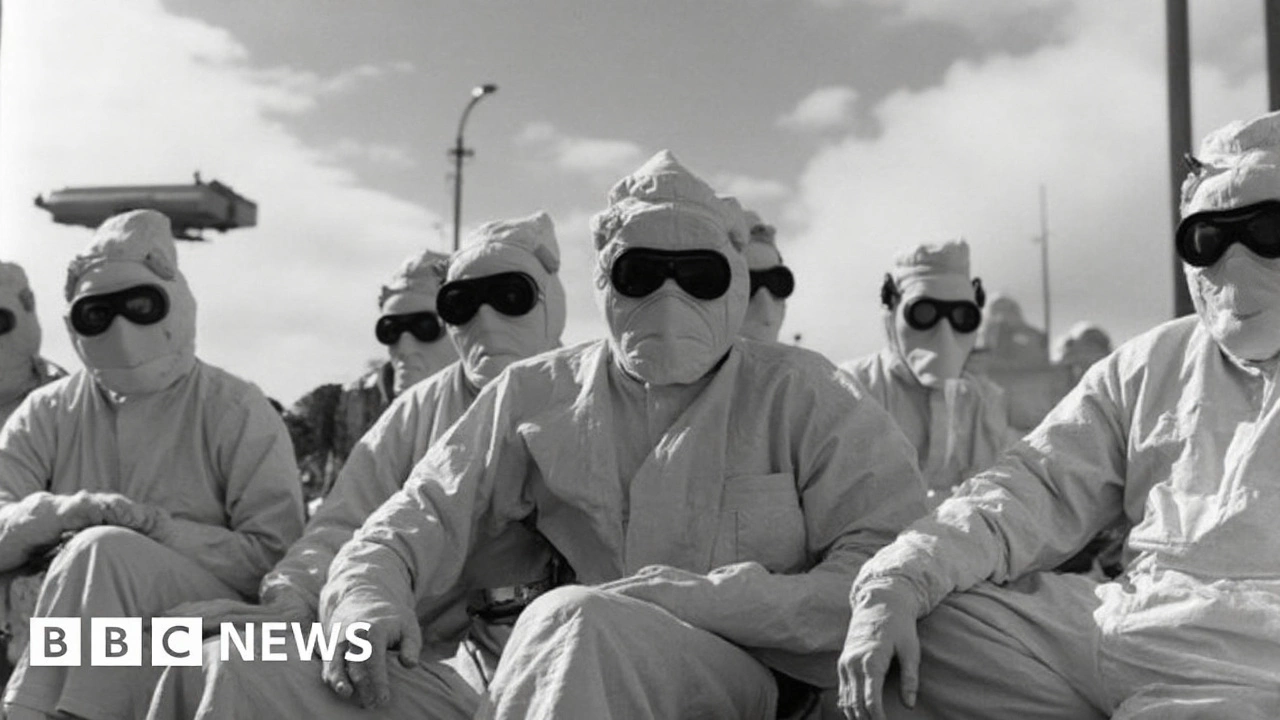Andy Burnham says the truth about Britain’s nuclear test veterans has been buried for decades—and he’s not talking in riddles. The Greater Manchester Mayor says newly surfaced government files show the Ministry of Defence knew servicemen were harmed and chose to brief the public with bland talking points anyway. The Mirror’s “Nuked Blood” investigation has put names, dates, and internal phrases to what veterans have alleged for years: tests were carried out, blood was drawn, abnormalities were seen—and then the story was managed, not told.
More than 22,000 British troops were sent to witness or support nuclear detonations and clean-up operations in the 1950s and 60s, on distant atolls and desert ranges. Many say their health—and in some cases their children’s health—has never been the same. Burnham calls it “an outstanding injustice,” and wants 2025 to be the year those veterans finally get answers, not boilerplate.
At the heart of this row is whether ministers and officials knew that exposure risks were real and measurable, and whether they misled the public when those risks surfaced in tests and medical notes. Campaigners say internal MoD documents—briefing lines, emails, and technical summaries—reveal a playbook designed to downplay or deny harm while withholding contradicting data. Burnham’s phrase for those “lines to take”? “Lies to take.” It’s loaded, but it captures the anger of families who have spent a lifetime asking for their records and getting blank pages back.
What the 'Nuked Blood' files show
Documents cited by campaigners and shared with police point to blood results from serving personnel that flagged lowered white cell counts and anemia. In plain English, those are red flags for potential radiation impacts inside the body. Veterans say they were told there was nothing to worry about. Some were told “no blood tests were necessary” at all—despite records indicating the opposite. Others say their files are missing or incomplete, which only deepens suspicion that uncomfortable results were filed away or never recorded properly in the first place.
Consider the setting. British and American tests took place in the Pacific—most famously around Christmas Island (Kiritimati) and Malden Island—and in Australia. Some veterans remember being told to turn their back to the blast, cover their eyes, and open their mouths to protect their eardrums. Accounts of heat on the skin, blinding light through closed eyelids, and a shockwave that rattled bones have been repeated for decades. Not everyone became ill, but many report cancers, blood disorders, fertility problems, and miscarriages. Families say they were left to connect the dots without access to the data that might have explained what happened.
The fresh push for accountability has coalesced around a 500-page dossier handed to the Metropolitan Police alleging misconduct and a systematic cover-up. The claim is simple: officials knew more than they said, and the public line did not match the private record. Dr Iain Overton of Action on Armed Violence calls it “a gross betrayal of trust.” Campaigners John Morris and Jane O’Connor have become the public face of a fight that has lasted most of a lifetime for the men and women involved.
Time is the enemy now. Many of the UK nuclear veterans are in their 80s and 90s. Some have died waiting for recognition and redress. Burnham wants a fast-track public inquiry with teeth—powers to compel documents, put witnesses under oath, and publish everything. He also wants cross-party backing so the process survives any change of government and isn’t kicked into the long grass, again.
The Ministry of Defence has long rejected the idea that servicemen were used as guinea pigs or left unprotected. Officials have historically pointed to studies that, they say, do not show a consistent pattern of harm across the whole cohort, and they note that veterans have access to War Pensions and Armed Forces Compensation where a service link is shown. In 2022 the government created the Nuclear Test Medal, which was welcomed by many families as overdue recognition—but a medal without medical truth or compensation feels hollow to those who are ill and undocumented.
That’s the core tension: official reassurances versus lived experience. Veterans say their medical records don’t just fail to prove harm—they fail to exist, or they contradict what they were told at the time. Without full records, past studies risk undercounting disease or missing clusters, and families are left with unanswered questions. If the “Nuked Blood” files are as clear as campaigners say, then the argument is no longer academic; it’s about who knew what, and when.
Burnham’s pitch is pragmatic. He’s not promising outcomes; he’s demanding a process that can force the release of documents and hear sworn testimony from those who wrote and followed those “lines to take.” He wants ministers to commit now, not after another winter passes. He also wants the civil service to hand over everything relevant—lab results, field reports, memos—so any inquiry isn’t working blind or chasing papers through redacted corridors.
Behind the headlines sits a web of policy choices that echo other British scandals—infected blood, the Post Office Horizon affair, contaminated sites—where withheld data and official defensiveness made the damage worse. Each time, the pattern was similar: people reported harm, were told they were mistaken, and spent years unlocking the evidence that proved they weren’t.
Internationally, other countries have moved—sometimes imperfectly—to compensate people exposed during nuclear testing. The United States set up programs that offered payments to certain categories of workers and residents. France established a scheme for victims of tests in Polynesia. The details, thresholds, and fairness of these schemes are debated, but the point is simple: some governments accepted that proving exposure and causation, one case at a time, is impossible for many people decades on. Veterans in Britain are asking for the same logic to be applied here.
There’s also the science. Radiation risk isn’t static; it depends on dose, shielding, distance, and biology. Many veterans weren’t issued personal dosimeters, and even where badges were used, they captured only part of the picture. Internal exposure—from inhaled dust or ingested particles—doesn’t always show up on a badge reading. Blood tests offer clues after the fact: low lymphocyte counts, anemia, or other cytopenias can hint at past insults to the bone marrow. Without reliable records of results, it’s hard to prove anything; with them, it’s hard to deny everything.
Previous government-commissioned studies have been cited to argue there was no overall excess mortality across all participants. Veterans counter that averages blur hotspots and that poor record-keeping, including missing medical results, undercuts the confidence those studies claimed. Both things can be true: a national average might look fine while specific groups faced real harm.
Legally, this fight has dragged on. Time limits and evidential hurdles have sunk many claims. In the past, courts have said cases were brought too late or lacked the documentation to clear the bar for proof. That’s exactly why campaigners want a policy solution—a presumptive framework where certain conditions trigger support unless there’s strong evidence they weren’t service-related. Without that, the system rewards the best archivists, not the most injured.
What veterans want, and what could change in 2025
Burnham and campaigners are pushing a tight, practical agenda. They say it’s not complicated if there’s political will, and they want both main parties on the hook now, not after an election.
- A fast-track public inquiry with full disclosure powers, a clear timetable, and a duty to publish the archive.
- A compensation scheme that recognizes the passage of time and the difficulty of proving exposure on a case-by-case basis.
- Guaranteed access to complete medical and service records for veterans and next of kin, with an independent audit of missing files.
- Funded health screening and research into possible intergenerational effects, guided by independent experts.
- A permanent point of contact in government so families aren’t bounced between departments.
Politically, the momentum is real. Backbench MPs from different parties have already shown interest, and veterans’ stories cut through on doorsteps. A simple pledge—commit to an inquiry and a compensation framework in 2025—would be easy to explain and hard to walk back. The Metropolitan Police now hold a detailed dossier; whether that becomes a criminal investigation is for them to decide, but its existence raises the stakes for anyone tempted to delay.
For the MoD, there’s a reputational choice. Keep defending the past, or help clear it up. That means releasing files without a fight, encouraging retired officials to give evidence, and helping veterans reconstruct their medical histories. None of that weakens national security or reveals warhead secrets. It just answers honest questions from people who served.
The veterans’ case isn’t built on perfect memory. It’s built on scraps of paper, gaps where records should be, and lives that look different after a blast they were told was “safe.” They don’t need blame to be sprayed in every direction. They need the file that explains the result, the line that contradicts the press release, the test that someone decided not to share.
Burnham keeps saying the quiet part aloud: 2025 has to be the year. Not because it’s a neat round number, but because time is nearly up for the witnesses who were there, standing on a shoreline, eyes covered, feeling the heat of a bomb they were told wouldn’t touch them. If those voices fade before the record is set straight, the country will have swapped a scandal for a silence. And that won’t hold.





